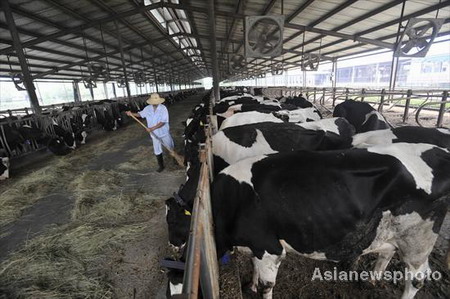
|
BIZCHINA> Center
 |
|
Related
Can China's dairy sector win back customer confidence?
By Nie Peng (chinadaily.com.cn)
Updated: 2008-09-23 14:35
 Behind the ongoing milk scandal is the history of a troubled industry. Regulators and dairy enterprises should look at many potential problems to protect the public and regain customers scared away by tainted milk. Sanlu Group acknowledged on September 11 some of its baby milk formula was contaminated with melamine, after at least one baby had died of kidney stones caused by the banned chemical in northwestern China's Gansu Province. Investigators found 22 dairy enterprises were involved in the contamination scandal, including such giants as Yili Industrial Group, Mengniu Group and the Bright Dairy & Food. Melamine was also detected in liquid milk produced by Yili and Mengniu. Many customers have lost confidence in domestic dairy products since the scandal broke, dealing a heavy blow to the country's dairy sector. According to a Monday report by China Business News, an executive with a well-known dairy company already warned in 2007 and earlier this year of problems in raw milk supply that could "wreak havoc on the whole industry". Cheaters see chances The Hebei provincial government said on September 14 that 19 suspects in the Sanlu formula scandal had been detained, among whom 18 were from milk collecting stations. Unlike developed countries, where dairy companies purchase raw milk from large farms and thus have good control over the quality of supplies, Chinese dairy producers usually buy raw milk from individual milk farmers or from milk collecting stations, the newspaper reported on Monday. In both supply modes, backward technology and poor management have a negative impact on ensuring a good quality of the raw milk. Worse, both modes contain loopholes that can be taken advantage of by cunning dealers, the report said. Dairy enterprises only conduct routine tests on the raw milk, such as the levels of water, protein, fat, bacteria and antibiotic residue. Take the protein test for example. It registers only nitrogen levels without specifying which types of protein the milk contains. Melamine, rich in nitrogen but banned in food processing, was then illegally added to the raw milk, which had been diluted with a large quantity of water, for protein tests. According to police, melamine had been added to milk since at least 2005. However, quality regulators as well as the public didn't pay attention to the problem until recently, when it was long overdue. An investigation team sent by the State Council, China's Cabinet, discovered that Sanlu lied about its tainted baby formula for eight months. The company began receiving complaints about suffering infants in December 2007. The Ministry of Industry and Information Technology has launched an investigation into the country's melamine producers, and required the labels to carry "forbidden in food processing and feed processing". (For more biz stories, please visit Industries)
|